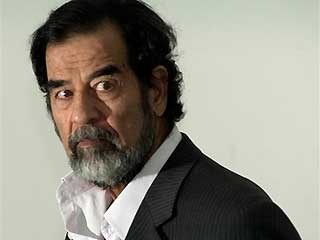Saddam Hussein hung for his crimes against humanity
HE WAS NO MATCH FOR THE US MILITARY.


Al Arabiya TV Reports Saddam Hussein Has Been Executed
Final Hours
U.S. official: execution 'within a matter of hours'
Statement echoes report Iraqi official says execution to happen by 10 p.m. ET as witnesses gather in Baghdad


BAGHDAD, Iraq — Saddam Hussein's date with death appears to be just hours away. The former president of Iraq will be hanged "within a matter of hours," a Bush administration official told FOX News on Friday.
"The final meetings have taken places," the official said, adding in Iraqis have requested Saddam be turned over to them. "The process is now in the final stage."
Earlier, the Associated Press reported via a top Iraqi official that Saddam would be hanged before 10 p.m. ET Friday night (6 a.m. Saturday in Baghdad).
The official witnesses to the impending execution gathered Friday in Baghdad's fortified Green Zone in final preparation for his hanging, and state television broadcast footage of his regime's atrocities.
Saddam's chief lawyer said the U.S. had turned over custody of the mass murderer to Iraqi officials, one of the last steps necessary before the execution. An Iraqi parliamentarian, Methal Al Aloser, backed up the lawyer's claims. Al Aloser said not only had Saddam been handed over, but all papers and documents were finalized and the execution will be soon.
But Bush administration sources, apprised of Al Aloser's remarks, reaffirmed that Saddam Hussein remains in U.S. custody.
Two State Department officials also told FOX News Saddam was still being held by Americans. "We are absolutely certain he has not been handed over," one official said. The official said the handover might not happen for a few more hours — or possibly even for a few more days.
"There is no reason for delays," said Munir Haddad, an Iraqi judge on the appeals court that reviewed Saddam's case. He also said the execution will occur by Saturday.
An unnamed Iraqi government official in Baghdad told the Associated Press that Prime Minister Nouri al-Maliki had signed the Butcher of Baghdad's death warrant.
Al-Maliki said "our respect for human rights requires us to execute him, and there will be no review or delay in carrying out the sentence."
Meanwhile, Saddam's attorneys asked a U.S. judge to block his transfer to the custody of Iraqi officials poised to carry out his execution.
Hussein's lawyers asked for an emergency restraining order aimed at stopping the U.S. government from relinquishing custody of the condemned former Iraqi leader to Iraqi officials, a spokeswoman for a federal court in Washington D.C. said.
A similar request by the former chief justice of the Revolutionary Court, Awad Hamed al-Bandar, was denied Thursday and is under appeal. Al-Bandar also faces execution. The Justice Department argued in that case that U.S. courts have no jurisdiction to interfere with the judicial process of another country.
A U.S. source in Baghdad said Al-Maliki wanted to carry out the execution as early as Thursday night, but that it was delayed for logistical reasons, and because of confusion over the Iraqi constitution and the law that governs the tribunal that convicted him of murder.
The Iraqi prime minister said those who oppose the execution of Saddam were insulting the honor of his victims. His office said he made the remarks in a meeting with families of people who died during Saddam's rule.
"Nothing and nobody can abrogate the ruling" upholding Saddam's sentence, al-Maliki said.
Najeed al-Nauimi, a member of Saddam's defense team, told FOX News that while sentence hasn't yet been carried out, "we're at a stage where we're requesting his body be handed over to his family."
Al-Nauimi also predicted Saddam will be defiant until the end, and go the gallows "smiling, and saying verses of the Koran."
Saddam was notified Thursday that his death sentence had been upheld. "His reaction was 'I was expecting that,' " al-Nauimi quoted Saddam as saying. Saddam then met with his half brothers and said goodbye to them.
Iraqi General Abdl Kareem Khalaf told FOX News that emergency procedures have been implemented in the former dictator's Salahadin province, where Saddam's hometown of Tikrit is, as well as Diyala and Mosul provinces, which have Sunni majorities. The emergency measures include more Iraqi army and police forces and more checkpoints.
Bryan Whitman, a Pentagon spokesman, said U.S. forces were on high alert.
"They'll obviously take into account social dimensions that could potentially led to an increase in violence which certainly would include carrying out the sentence of Saddam Hussein," Whitman said.
• Visit FOXNews.com's Iraq Center for more in-depth coverage.
A video of the execution is expected to be released.
In his Friday sermon, a mosque preacher in the Shiite holy city of Najaf called Saddam's execution "God's gift to Iraqis."
"Oh, God, you know what Saddam has done! He killed millions of Iraqis in prisons, in wars with neighboring countries and he is responsible for mass graves. Oh God, we ask you to take revenge on Saddam," said Sheik Sadralddin al-Qubanji, a member of the Supreme Council for the Islamic Revolution in Iraq, known as SCIRI, the dominant party in al-Maliki's coalition.
One Bush administration official downplayed the possibility of a "Goering scenario" occurring, a reference to the high-ranking Nazi official Hermann Goering, who cheated the hangman at Nuremberg by swallowing a cyanide capsule slipped to him. "[Saddam]'s not going to have any friends in the room," the official said, referring to Saddam at the moment of his execution.
Iraq's highest court on Tuesday rejected Saddam's appeal against his conviction and death sentence for the killing of 148 Shiites in the northern city of Dujail in 1982. The court said the former dictator should be hanged within 30 days.
While Saddam's death for the Dujail massacre appears imminent, he's still facing trial for other atrocities. Saddam faces genocide charges related to a coordinated campaign that killed up to 100,000 Kurds, according to Human Rights Watch. During that campaign, Saddam used chemical weapons, which killed some 30,000 Iraqis and Iranians.
Al-Nauimi said the timing of Saddam's imminent execution is "political revenge being carried out by the present government," adding the trial process was biased.
Some international legal observers and human rights groups have called Saddam's trial unfair because of alleged interference by the Shiite-dominated government. There has also been internal debate among Iraqis about legal procedures surrounding the timeframe and whether the presidency is required to approve the execution.
"The law does not say within 30 days, it says after the lapse of 30 days," said Busho Ibrahim, deputy justice minister. There was no immediate explanation for the conflicting claims.
Chronicle of the atrocities committed by Saddam Hussein:
Hussein's regime killed, tortured, raped and terrorized the Iraqi people and its neighbors for over two decades.
Hundreds of thousands of people died as a result of Saddam's actions.
Saddam had approximately 40 of his own relatives murdered.
1980-88: Iran-Iraq war left 150,000 to 340,000 Iraqis and 450,000 to 730,000 Iranians dead.
1983-1988: Documented chemical attacks by Iraqi regime caused some 30,000 Iraqi and Iranian deaths.
1988: Chemical attack on Kurdish village of Halabja killed approximately 5,000 people.
1987-1988: Iraqi regime used chemical agents in attacks against at least 40 Kurdish villages.
1990-91: 1,000 Kuwaitis were killed in Iraqi invasion of Kuwait.
1991: Bloody suppression of Kurdish and Shi'a uprisings in northern and southern Iraq killed at least 30,000 to 60,000. At least 2,000 Kurdish villages were destroyed during the campaign of terror.
2001: Amnesty International report: "Victims of torture in Iraq are subjected to a wide range of forms of torture, including the gouging out of eyes, severe beatings and electric shocks... some victims have died as a result and many have been left with permanent physical and psychological damage."
Human Rights Watch: Saddam's 1987-1988 campaign of terror against the Kurds killed at least 50,000 and possibly as many as 100,000 Kurds.
Refugees International: "Oppressive government policies have led to the internal displacement of 900,000 Iraqis."
Iraq's 13 million Shiite Muslims, the majority of Iraq's population of approximately 22 million, faced severe restrictions on their religious practice.
FBI: Iraqi government was involved in a plot to assassinate former President George Bush during his April 14-16, 1993, visit to Kuwait.
The Iraqi regime has repeatedly refused visits by human rights monitors.
From 1992 until 2002, Saddam prevented the U.N. Special Rapporteur from visiting Iraq.
(Sources: Office of the White House Press Secretary: Life Under Saddam Hussein: Past Repression and Atrocities by Saddam Hussein's Regime; April 4, 2003, http://www.whitehouse.gov/news/releases/2003/04/iraq/20030404-1.html; "Iraq: Crimes Against Humanity," State Department, May 7, 2002, http://usinfo.state.gov/regional/nea/iraq/crimes; "Iraq: U.S. Alleges Role in Bush Death Plot," Facts on File May 20, 1993; http: http://www.2facts.com/; http://www.2facts.com/stories/temp/10882temp1993053677.asp)
Timeline of Saddam Hussein's Life and Career:
April 28, 1937: Born in village of Uja near desert town of Tikrit, north of Baghdad, Iraq.
1957: Joins underground Baath Socialist Party.
1958: Arrested for killing brother-in-law, a communist; spends six months in prison.
Oct. 7, 1959: Participates in Baath team that ambushes Iraqi strongman Abdel-Karim Kassem in Baghdad, wounding him. Saddam wounded in leg, flees country.
Feb. 8, 1963: Returns from Egypt after Baath takes part in coup that overthrows and kills Kassem.
July 30, 1968: Takes charge of internal security after Baath seizes power and authority passes to council headed by Ahmed Hassan al-Bakr, Saddam's cousin.
July 16, 1979: Takes over as president of Iraq from al-Bakr; launches purge of Baath.
Sept. 22, 1980: Sends army into Iran, setting off eight-year war.
July 8, 1982: Survives assassination attempt in Dujail, a mainly Shiite Muslim town 25 miles north of Baghdad. In retaliation, Saddam's security forces attack the town. (The events in Dujail were the subject of the criminal charges in Saddam's initial trial.)
March 28, 1988: Uses chemical weapons against Kurdish town of Halabja, killing an estimated 5,000 civilians.
Aug. 2, 1990: Invades Kuwait, leading to war with U.S.-led coalition that liberates Kuwait the following February.
March 1991: Crushes Shiite Muslim revolt in the south and Kurdish revolt in the north.
March 20, 2003: Missed by bombing attack as U.S.-led forces try force his ouster.
July 22, 2003: Sons Qusai and Odai killed in gunbattle with U.S. troops.
Dec. 13, 2003: Captured by U.S. soldiers in Tikrit.
June 30, 2004: Transferred into Iraqi custody.
July 1, 2004: Arraigned before judge and defiantly rejects charges of war crimes and genocide.
Dec.17, 2004: Sees Iraqi lawyer for the first time since his capture.
June 13, 2005: Shown in video being questioned about 1982 massacre in Dujail.
July 13, 2005: Faces first charges against him as tribunal chief judge says investigation into Dujail killings complete.
Aug. 23, 2005: Fires legal team.
Oct. 19, 2005: Pleads innocent as trial opens in Dujail case. It is immediately adjourned.
Oct. 20, 2005: Ohne of his defense attorneys is kidnapped and killed.
Nov. 8, 2005: Another defense attorney is killed in an ambush.
Dec 5, 2005: Denounces trial as public relations exercise after witnesses tell of horrors committed during his rule.
Dec 7, 2005: Refuses to enter court after telling tribunal to "go to hell" the night before. Judge eventually decides to press on without him.
Dec 21, 2005: Seventh session of trial begins. The next day the trial is adjourned until Jan. 24 after another turbulent session.
Dec 25, 2005: Saddam’s lawyers say they have asked the court for independent inquiry into claims his American captors tortured him.
Dec 29, 2005: Saddam's chief lawyer sends a letter to Bush saying he should be freed if the U.S. wants to end its problems in Iraq and earn the friendship of Arabs.
(Sources: AP: Events in the life of Saddam Hussein; 11/28/05; Key events in life of Saddam Hussein, Associated Press, 10/18/05; NPR, 10/18/2005 -
Timeline: Saddam's Violent Road to Trial -
http://www.npr.org/templates/story/story.php?storyId=4961744; Reuters: Chronology of Saddam Hussein's trial; 15 Jan 2006; http://www.alertnet.org/thenews/newsdesk/GEO531614.htm)










































0 Comments:
Post a Comment
<< Home